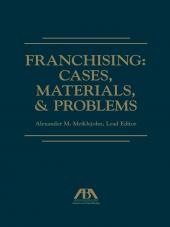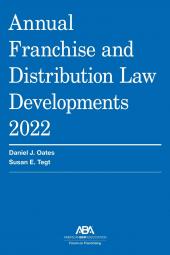Franchising Cases, Materials, & Problems
Select a format
 International Order Inquiry
International Order Inquiry
Select subscription type
Terms & conditions
Subscribers receive the product(s) listed on the Order Form and any Updates made available during the annual subscription period. Shipping and handling fees are not included in the annual price.
Subscribers are advised of the number of Updates that were made to the particular publication the prior year. The number of Updates may vary due to developments in the law and other publishing issues, but subscribers may use this as a rough estimate of future shipments. Subscribers may call Customer Support at 800-833-9844 for additional information.
Subscribers may cancel this subscription by: calling Customer Support at 800-833-9844; emailing customer.support@lexisnexis.com; or returning the invoice marked "CANCEL".
If subscribers cancel within 30 days after the product is ordered or received and return the product at their expense, then they will receive a full credit of the price for the annual subscription.
If subscribers cancel between 31 and 60 days after the invoice date and return the product at their expense, then they will receive a 5/6th credit of the price for the annual subscription. No credit will be given for cancellations more than 60 days after the invoice date. To receive any credit, subscriber must return all product(s) shipped during the year at their expense within the applicable cancellation period listed above.
The total price includes the product(s) listed in the Order Form and any Updates for a limited period (minimum period of 30 days) after the order is placed ("Order Window"). Shipping and handling fees are not included in the grand total price.
All shipments may be returned, at subscribers' expense, for full credit of the Price within 30 days of receipt.
Shipments may not be returned, and no credits will be issued, more than 30 days after receipt.
After the Order Window, subscribers will receive notice of Updates along with the then-current grand total price and order process as Updates become available. Subscribers will only be shipped those Updates they specifically request.
Product description
View a sample of this title using the ReadNow feature
The concept of franchising can be traced back at least to the Middle Ages, when artisans were allowed to hang their guild signs, but had to meet certain criteria before they could practice their trades. As a modern business concept, franchising traces its roots to the Singer Sewing Company distribution system, and, as a very modern day business concept, to the rise of current franchising systems like McDonald s and Holiday Inns. Today there are thousands of franchise companies in the United States, with franchisee ranging in number from a single unit to over 10,000.
However, as an area of academic study, however, franchise law is a new kid on the block. Today, there are only a handful of law schools maybe ten that offer franchise law as a course of study.
Many casebooks are constructed by academics who have spent the primary portion of their careers in teaching environments. This casebook is different. Some of the contributors are full-time faculty members and some have taught franchising in various law schools, but most have been private practitioners for the bulk of their careers. Collectively, the practitioners have spent more than 500 years working with clients in the real world and thinking about the kinds of questions that the book explores. They are some of the best and the brightest, and the most experienced in the field of franchise law. Their experience brings to this casebook a blend of theoretical and practical perspectives on the legal and policy issues raised by franchising as a business model.
Franchising Cases, Materials, & Problems is designed for use in a franchise law course. The introduction and the chapter on the history of franchising offer broad perspectives on the material that later chapters explore in greater depth. A teacher who wishes to emphasize the role of intellectual property concepts in franchise law can assign the chapters on trademarks, trade secrets, and copyright in full as well as parts of other chapters. A teacher who prefers to emphasize the regulatory aspects of franchise law can assign the chapters on disclosure and relationship laws in full, supplemented by parts of other chapters. Together, the chapters on regulation raise provocative questions concerning American federalism. The chapter on other types of business relationships highlights both the difficulty of defining the legal term franchise with precision and the remarkable variety of business relationships that franchise laws may govern.
eBooks, CDs, downloadable content, and software purchases are noncancelable, nonrefundable and nonreturnable. Click here for more information about LexisNexis eBooks. The eBook versions of this title may feature links to Lexis+® for further legal research options. A valid subscription to Lexis+® is required to access this content.
 Lexis Nexis
Lexis Nexis 
